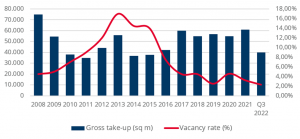The office space market continues its expansion after the pandemic period, so towards the year end we are recording the strongest demand on the Zagreb market in the past 2 years. Weather companies choose to implement hybrid or flexible work models, they must continue to develop and invest furthermore in their office space infrastructure in order to provide employees with a stimulating and creative place to work. The rate of vacant office space is less than 3%, which is extremely low and as such is the lowest compared to all capital cities in the region. This is due to the fact that construction of new office space projects is twice less than the total annual demand and realization, which has been over 55,000 m2 in the last 5 years of rented office space per year.

Prices are slightly increasing
There is a lack of new first-class office space projects in the market which, with their infrastructure, concept and all necessary additional content, can meet all the needs of today’s modern business and, extremely important, follow ecological and sustainability standards. Of the entire offer of office space and projects in Zagreb, 65% are older than 15 years and fall into the class B, so there is plenty of room on the market for new office projects. Office space rental prices have also grown in the previous period due to the low vacancy rate and both high and stable demand, so now the rent for first-class office space is between 13-15.5 €/m2, while for class B the rental price is between 10-12€/m2.
Interior design trends
Modern times and new technologies have significantly influenced the way of doing business. It used to be considered that it was enough to provide an employee with a desk and a computer, however nowdays office space is increasingly used to evoke a sense of optimism, well-being and belonging, encourage greater engagement and improve overall results.
In the last few years, new trends in the organization of office space are mostly present in the ICT sector, however other sectors such as banks and auditing companies are progressively turning to them. Instead of classic separate offices, employees are preferring a system of connected areas where they can work, that support different ways of working and give employees the opportunity to choose whether a group or individual work is more appropriate at a given time. Also, as a consequence of the new way of working, plug & play informal work zones are increasingly used, in order to improve communication and increase the productivity of employees through the mentioned diversity of space.
As a consequence of the coronavirus pandemic, more and more companies are further considering organizational changes within their office space, as the consequence of the introduction of a hybrid work model which combines work in the office and work from home, which would enable flexibility of working hours and places where work will be performed. For that reason, companies insist on the office spaces that offer more flexibility. With the stabilization of the health situation, large number of companies will continue to work in flexible office spaces that will be adapted to the new working conditions.
There will be increased demand for new workplace design, including more digital, flexible and health-oriented working solutions.
Work from home/remote work and the widespread usage of new digital technologies have enabled companies to operate more or less regularly even in the time of the pandemic, while a number of them plan to keep a hybrid model of work in the post-pandemic period.
ESG in Real Estate
ESG (abbreviation of Environmental, Social and Governance) is a term that refers to a set of standards that guide corporate policies to be in line with the concepts of sustainable development in the areas of environment, social responsibility, and corporate governance. The most important elements of environmental protection are: use of natural resources, energy efficiency, emission of harmful substances into water and air, carbon dioxide emission, waste generation, sustainability initiatives. Some of the more important elements of social responsibility are: safety and health in the workplace, human rights, protection of personal data and privacy, employee training, diversity and opportunity policies, community programs. The elements of management are: business ethics, rights of owners, communication with interested parties, commitment of management.
